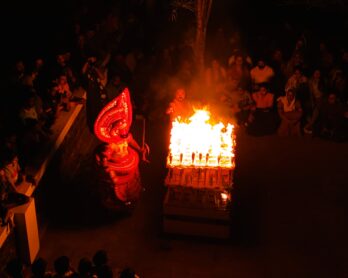She is probably the reason we are a nation of tea drinkers. A comely smile connects cherry-tan cheeks, a mop of lustrous black hair peeps from beneath a colourful headband that holds aloft a polished cane basket and between her dainty smooth fingers a rain-washed tea leaf. All around her the supernal green glow of her sun-kissed workplace undulates in every direction. The trepidation in her eyes is alluring – one can easily change the leaf for a bitten apple. She is variously the quintessential worker adorning the cover of
Belgian monk Francis Acharya decided to come to India after he met Gandhi in London. So impressed was he by the Mahatma’s espousal of the tenets of Hinduism that he wanted to work for the ‘encounter between Hinduism and Christianity.’ After several unsuccessful applications for visa he finally approached Vijayalakshmi Pandit who was the Indian High Commissioner in England at that time. The visa was finally granted after Jawaharlal Nehru sought a personal guarantee from Acharya that he wouldn’t proselytise. Acharya then travelled across the country before setting up his
As children, our parents kept me and my sisters away from adultery and blaspheme by shifting to English. So we might all be sitting around and talking about the annual day celebrations of our village school in Koko, rural Nigeria, in Malayalam. Suddenly, they would go ‘Mrs Gloria caught Miss Pereira and Mr Okay in a tight embrace in an empty staffroom,’ in English. Or, how Umma, Fr John’s sister ‘was rumoured to have slept with half the congregation.’ We pretended these little loaded nuggets went over our heads so









